Student Blog
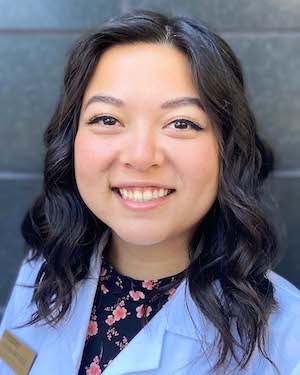
OT Dance Party ⟩
November 17, 2021, by Alyssa
I’ve been teaching Zumba at the USC Village Gym since Fall 2018. As an extrovert who struggles to prioritize exercising, it has been a win-win. I am obligated to get myself to the gym and energized from both the exercise and the social time. Especially with how challenging graduate classes can be, it is a much needed reset to my week every Tuesday.
So, what does this have to do with OT?
This week in OT 534 Health Promotion & Wellness we had a “wellness workshop” day where students got to facilitate and attend different occupation-based activity groups to promote personal wellness. When we got the sign-ups to facilitate a group, I signed up right away. Bringing Zumba to OT school!
My fellow students submitted their preferences and were assigned to different workshops to attend during class time (some of the other options were cookie baking, songwriting, and vision boarding 😮).
Given that dancing in classrooms filled with tables and chairs would not be ideal, we had to improvise for the space. We were out facing the elements on the lawn (muddy uneven grass, an unexpectedly hot November day) with a small speaker and a lot of funny looks from people walking by. But still, I had a blast, and based on all the laughing at/with me & each other, I think the participants did too. It was such a fun chance to share one of my favorite occupations with my friends, especially those who have never done it before. Dr. Cox stopped by during the workshop and thought I was putting up a “fight on ✌️” while dancing . . . truthfully I was just indicating that the move should be done twice, but hey — two birds one stone.
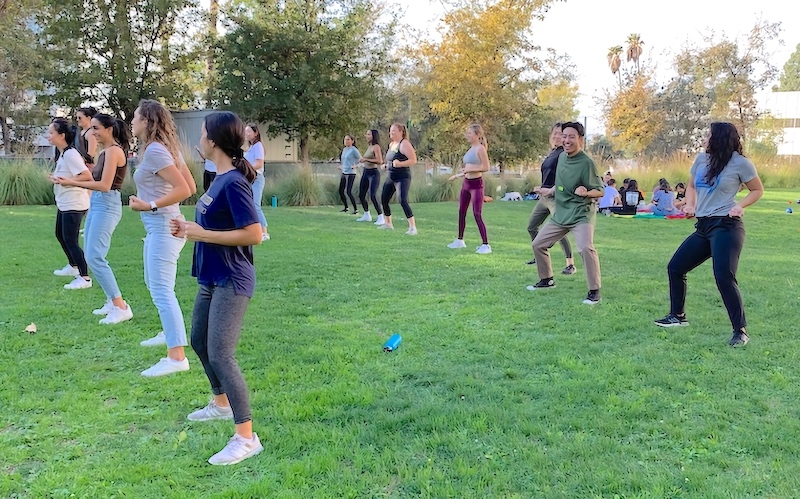
2nd year Entry-Level MA students participating in the Zumba workshop. Photo by Silvia Hernandez Cuellar
Even though I did not get to participate in the other activities, I loved how Wellness Workshop day highlighted how seemingly random skills could be an asset for OT’s role in health promotion. What other career path has a place for backgrounds in dance and martial arts and songwriting and cooking and crafting? I mean, OTD Resident John J. Lee even facilitated a Squid Games competition. Opportunities for wellness are everywhere — you never know what skills your colleagues will bring to the table!
⋯
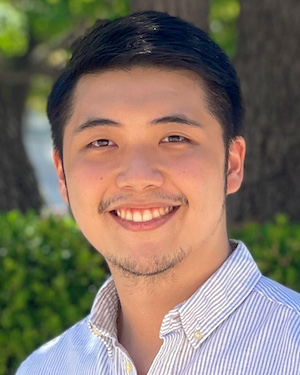
Things I Learned from Falling Down ⟩
November 16, 2021, by Marvyn
Remember my very first blog post when I said my OT journey wasn’t cookie cutter? Click here if you haven’t read it yet. I had a lot of setbacks before I became an occupational therapist back in my home country, the Philippines. But as many people would say, nothing worth having comes easy. It is really those setbacks, that led me to be who I am today. Here are just a couple of things I learned from these setbacks.
#1, Everything happens for a reason.
Setbacks suck. You planned to achieve your goal and worked so hard, only to have it crash down and fail. So now, you feel disappointed in yourself for letting this happen. You feel like you failed a lot of people’s expectations. You then go down a slippery slope that sets you up on a dangerous snowball of hurt. I remember being in that snowball many times, and the crash landing hurt the most.
I think there is a sense of calm in understanding that some things, whether good or bad, MUST happen for your personal growth. I mean, who wants to watch a movie without conflict? I remember when I was struggling and eventually failed to meet my undergraduate professor’s expectations, I did nothing but blame myself for it. But later when I realized that this needed to happen, I understood that had there been no setback, there was no room for growth and improvement. Now that I know the feeling of disappointment, I did everything I could to not experience it again.
#2, It’s useless worrying about things you cannot control.
“Oh no, my plans failed! My life is over!” You start worrying about what comes next. You think relentlessly about the problems you will face. You start panicking because you have no backup plans and have no idea what to do. To some extent, you even start to contemplate giving up on your goal.
I am the type of person that plans out what I want to do in my life. But when life plans do not go the way as planned, I used to panic and worry about things that haven’t even happened yet. It’s like dodging a rock without anything being thrown at you. I just ended up being very tired. Instead, I found that learning the art of “letting go” lifts the weight off my chest. Now while I reflect on my mistakes, I learned that in failing to meet my undergraduate professor’s expectations, I am unable to influence what others will think of me. I am also unable to change what I did because what’s done is done! So instead of worrying about anything and everything, I started thinking about the small things I need to do to improve, like tweaking my schedule to fit the demands, calculating small steps to take to get back up.
#3, Revenge is so sweet.
And by revenge, I meant I developed a strong internal motivation to become stronger, more resilient. I always tell my friends that a small setback is only setting you up for a major comeback. When I found out my life didn’t go the way as planned, I took that as an opportunity to grow. Like in any movie, the protagonist fails and experiences hardships, but they always find ways to come back stronger. The internal flame that burned inside was my motivator to stand back up and to keep fighting for my goals. I took all the necessary steps to be better than I was, and I was determined to not repeat the same mistakes. I made sure I prioritized self-love and focused on strengthening my personal relationships as well.
Overcoming these setbacks is the best type of revenge you can make. The feeling of “Nothing is going to stop me now!” is exhilarating, most especially if you start succeeding in achieving your goals! It’s like winning an arcade boss fight after losing over and over again. After your self-reflection, growth, and improvements, you can see yourself fighting back much stronger than you had before.
Every superhero has an origin story. And it seems like failure must be a major prerequisite to become one. After countless setbacks and continuous life tweaks, you would think I would gain a sense of tolerance, but quite frankly life doesn’t work that way. I’m not here to say, “There there. It’s okay.” Instead, I’m here to remind you that although things could and will get rough, never lose sight of your goals in life. Had I not experienced what I have had in my past, I wouldn’t have been able to be where I am today: achieving my dreams here at USC. My OT journey is definitely not a linear path, but I learned to be grateful for every experience I am getting, all the good and bad. After some time when you look back at where you have been and gone through, you’d be proud of how far you’ve gone and what you have accomplished. Keep at it, you superhero, and always Fight On!
⋯
Reconnecting with my Filipino Roots at USC Chan ⟩
November 15, 2021, by Global Initiatives Team
By Abby Khou, Entry-Level Professional Master’s student and Global Initiatives volunteer
Editors Alison Chang and Vanessa ElShamy
Entry-Level Professional Master’s students
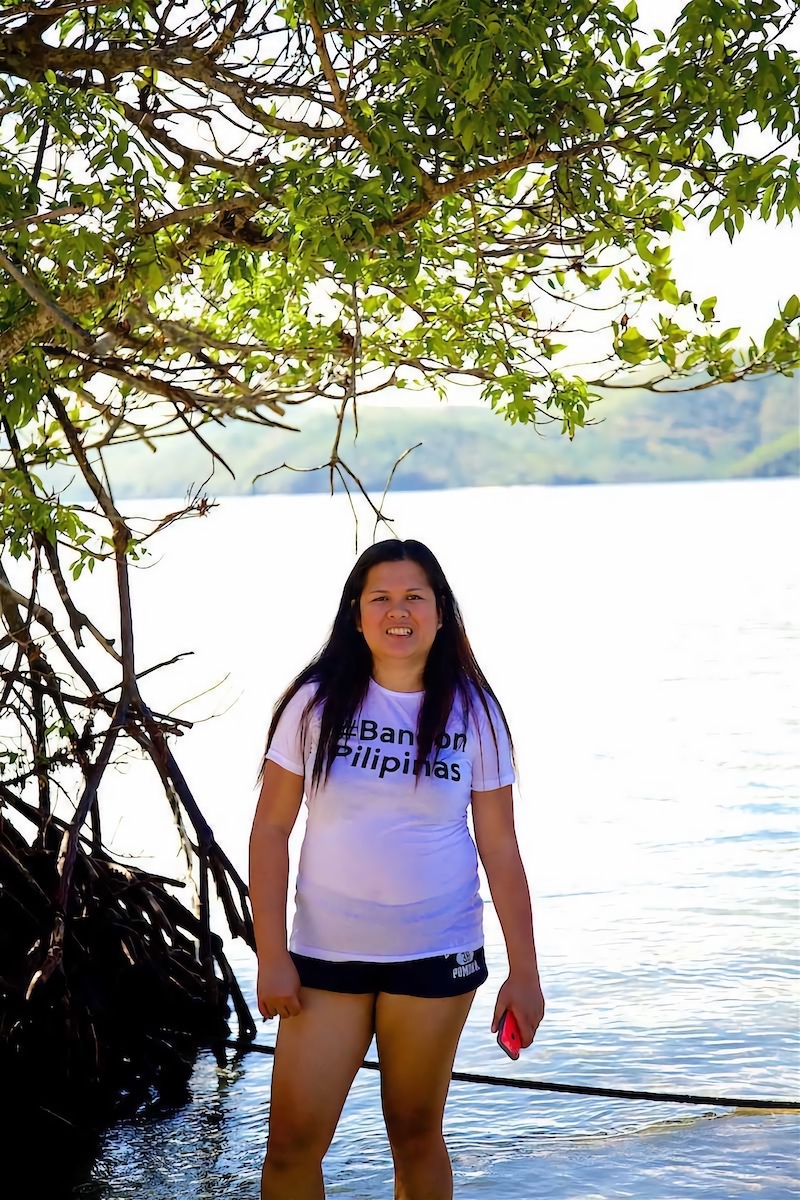
Abby’s visit to Palawan, Philippines
When I first came to the United States as a Filipino immigrant in 1999, I didn’t realize that one of the questions I would be asked the most is “are you a nurse?” While it is one of the popular Filipina stereotypes, it does hold some grain of truth — many Filipino men and women come to the US and either study nursing or work as nurses. In Filipino culture, healthcare workers are held in high regard. I would hear some of my family members boast of their children who work in the medical field or are the pride of their families because of their line of work. Why do Filipinos make such good healthcare workers? I may sound a tad bit biased — my mom is a nurse in Pennsylvania and my dad is a doctor in the Philippines! 😊 I believe that Filipinos are intuitively compassionate, caring, and selfless. They go out of their way to make other people feel comfortable, even when they’re sacrificing their own comfort.
It seems almost inevitable that I would end up pursuing a healthcare career, but I never thought it would be Occupational Therapy. I didn’t see myself as a nurse because I was always a bit anxious when I would get blood drawn. I only found out about OT 4 years ago because of my son’s Autism Spectrum Disorder (ASD) diagnosis. Being a big proponent of Early Intervention, I learned about OT as a parent sitting in on his OT sessions and conversing with his OTs in his Early Intervention program and outpatient pediatric clinic. His OTs made such a big impact in his growth and development that I decided I wanted to do for others what my son’s OTs had done for him. I had been working in public relations and marketing since 2007. In Manila, I was working at a TV network in 2001 and had no idea OT even existed. OT in the Philippines was at its infancy in 1917 when the Philippines’ government enacted the Revised Administrative code, which ensured that those who were injured while serving the government were compensated for ensuing disability and/or injury while serving. OT was introduced to the Philippine Civil Administration Unit I (PCAU I) General Hospital by Andre Roche, an OT of French origin. Similar to in the U.S., OT in the Philippines had its roots in the World War — the purpose of PCAU I was to care for Filipinos and Americans who were impacted by WWII.

Palawan, Philippines
Now in 2021, as a Filipino-American and non-traditional OT student who is pursuing the profession as a second career, I am grateful for the opportunity to connect with my Filipino roots at USC Chan. OT is quickly becoming a sought-after career in the Philippines, and I have met quite a number of Filipino international students pursuing their Post-Professional MA degrees in OT. Two kababayans (fellow Filipinos) were my instructors as OTD residents in the summer and fall. One great interaction I had was with Jerzl Awit, who is the OTD resident for our Quantitative Research class. I attended her workshop for my Literature Search paper and connected with her during the session because we both speak Tagalog (the primary Filipino language). I also met Nicole Parcon, an MA-1 student from the 2021 SOTI Program and exchanged emails with her after we met on Zoom. Now, she is a friendly face that I often bump into and chat with on campus. The sound of Tagalog in the hallways of USC Chan always brings me back home, and the connections I have already made feel like the comfort of warm sabaw (soup) on a cold, rainy day. I am proud of my Filipino colleagues who passionately pursue their OT degrees at USC Chan as part of their journey to becoming an OT practitioner.

Abby’s visit to Palawan, Philippines
⋯
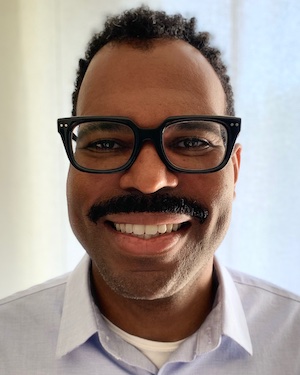
How to go to OT graduate school after being out of school for a long time — Step 3: Getting volunteer hours with an occupational therapist* ⟩
November 12, 2021, by Guy
One of the things I struggled with doing in my attempt to apply to graduate school was figuring out how to observe or gain direct experience in an occupational therapy setting in order to meet those mandatory volunteer hours so many OT graduate schools list as an application requirement. Right now with the pandemic, the ability to do this is even more daunting. Unfortunately, some graduate schools are still making this an application requirement. Depending on the graduate school, the volunteer requirement might be a minimum amount of hours shadowing an occupational therapist or the requirement might be stated more generally during the application process where the school tells applicants that admissions preference will be given to those that have volunteer experience in a clinical setting related to occupational therapy. To me, the latter statement was the worst because I interpreted it to be saying you better get a gazillion volunteer hours if you even want to be considered . . . and I had no clue what a gazillion hours could possibly mean. You also have places like USC that don’t require any hours at all because there is a recognition that volunteer experiences can sometimes be good, sometimes be bad, and that getting a volunteer experience is not always possible (especially in these times of Covid). So for those of us folks that are working and maybe have kids, or are caring for older family members, etc., how do we even consider trying to fit in observation or volunteering before applying. I mean come on . . . I work, I got bills to pay, I have to take my mother to her doctor’s appointment, and I’ve got to drop off and pick up my kid from school. Do I really need to do this? How can I do this? Well the answer for me was yes, you do need to do this, and you can do this. I came to the realization that this was not just a performative step I had to take for graduate school admission, but more importantly, it could be a way for me to get a better understanding of occupational therapy and help me feel more confident in my decision to make this career change.
But how would I do this? Just a reminder before I describe what I did, don’t forget to do what works for you. You do you! To start I had to sit down with my partner and discuss how and why I needed to do this, and how it could impact my ability to work and maintain family commitments. We needed to determine how much time I could dedicate to volunteering/observing on a weekly basis. That was the easy part. I decided I could do 2 hours or 3 hours one day a week. Then I needed to figure out where I would volunteer. That was the hard part. Well, I started by making cold calls to a few places where occupational therapists work: skilled nursing facilities, rehab facilities, and outpatient clinics. If I was able to get someone, those conversations usually were a dead-end, either because they didn’t allow for volunteers (usually because of HIPAA), or they had OT grad students doing fieldwork. One occupational therapist at a skilled nursing facility actually seemed excited to have me come in for an interview only to then call back to tell me her boss said “Nope!”. After making calls to around 30 places, I decided I would start to visit places in person (this was during pre-Covid, and in New York City, which is really easy to get around on public transportation and there are many many facilities with occupational therapy).
While these visits didn’t necessarily land me a volunteer opportunity, with each encounter I picked up invaluable information about the settings and got a better feel for my future career. I saw privately operated hand clinics, outpatient neuro rehab clinics, skilled nursing facilities, inpatient rehab facilities, long-term care, sensory gyms, group homes, and even hippo-therapy. The process of looking for a place to observe/volunteer became an education in and of itself. I not only became better acquainted with the various occupational therapy practice areas, but I started to hear about places that actually take volunteers on a regular basis, and I just became better acquainted with the practice areas of occupational therapy. This led me to a teaching hospital with a structured volunteer program for people interested in occupational therapy in their outpatient clinic. I was all set to go when I found out that the commitment was a 4-hour shift on a day that conflicted with when I needed to go to work. I asked if I could come in for only two hours instead of 4. But they said they just didn’t want to commit to a person who could only give a couple of hours a week . . . The good part of all of this was it made me realize I needed to revisit the amount of time I would need to set aside for volunteering. I just didn’t know that most places don’t want someone to come in for just a couple of hours. If I was going to make this happen I needed to be able to recognize I might need to commit up to 4 hours or more for a shift. I found that it’s just how things seem to work.
In the end, I was able to volunteer at the VA thanks to that occupational therapist who walked into the bar. I also had the chance to volunteer at an inpatient rehab facility after getting a tip during another conversation with someone who knew someone who volunteered at that facility. While it took a while to find these experiences, both experiences were invaluable in helping me to feel secure in my decision to change careers.
If you are looking for volunteer opportunities, and don’t know where to start, just start asking around and visiting places. Also, USC has this handy list.
*With the pandemic, I know securing an experience with an occupational therapist can be very hard to do right now. Hopefully, this will change soon.
⋯
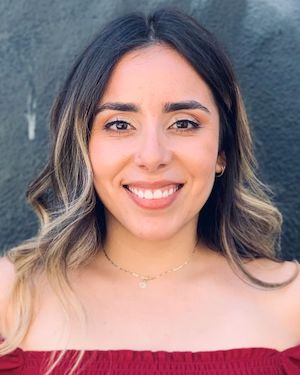
La Primera, Pero No La Ultima ⟩
November 9, 2021, by Silvia
To my sisters and to the siblings of other first-generation students: you belong here. We may be the firsts, but we won’t be the lasts.
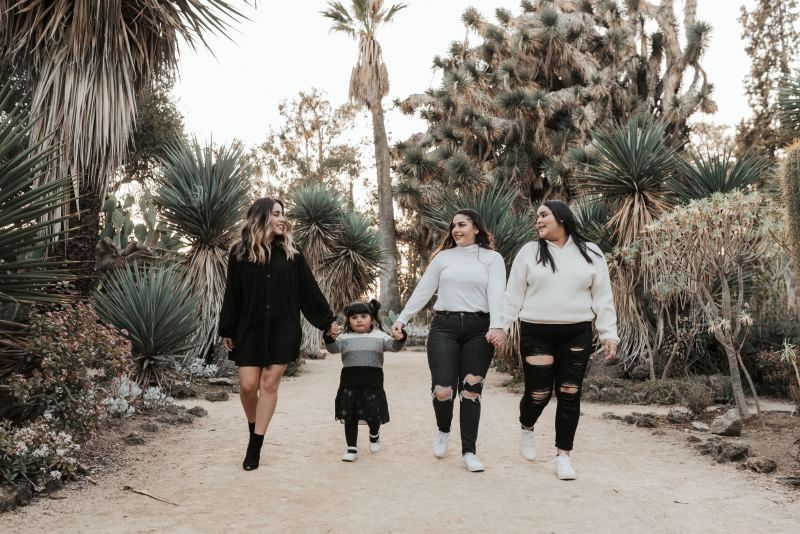
Hermanas, I will hold your hands every step of the way — Photo by: fatimajphotography
“Everybody looks rich and smart” — An observation of the USC Village made by my sister.
Sis — do I look rich to you? Maybe a little smart, but rich? Talk about a “she doesn’t even go here” moment. I think about this moment a lot because reading between the lines it means that she can’t fully believe that I do go here, and even more upsetting, I don’t think she sees the possibility of herself going here either. This speaks to feeling like you don’t belong in certain spaces because when you look around, there isn’t many, if any, people who look like you. Though her description may not encapsulate everyone who goes to USC, her feelings and thoughts are valid. I, along with many other first-generation students, have felt this way throughout our collegiate journey.

Graduating Undergrad as 1st Gen — Photo by: Madison Noelle Photos
When I tell you that immigrant, three-year-old, non-English speaking me could have never imagined being here today — finishing my master’s degree at the top OT program — I mean it. Growing up, college was never a topic of conversation in my house, yet education was always emphasized to be the key for a better future. Getting good grades was expected and not something to be rewarded for — the one time I asked my mom if I could get an allowance for having straight As she was quick to say “. . . mira mira, ya parece que te voy a dar dinero por hacer tu trabajo en la escuela . . . esa es tu responsabilidad.” Being a good student was my responsibility and something I took great pride in. Subconsciously, it was also something I held onto with the hopes of getting into a “good” college one day.
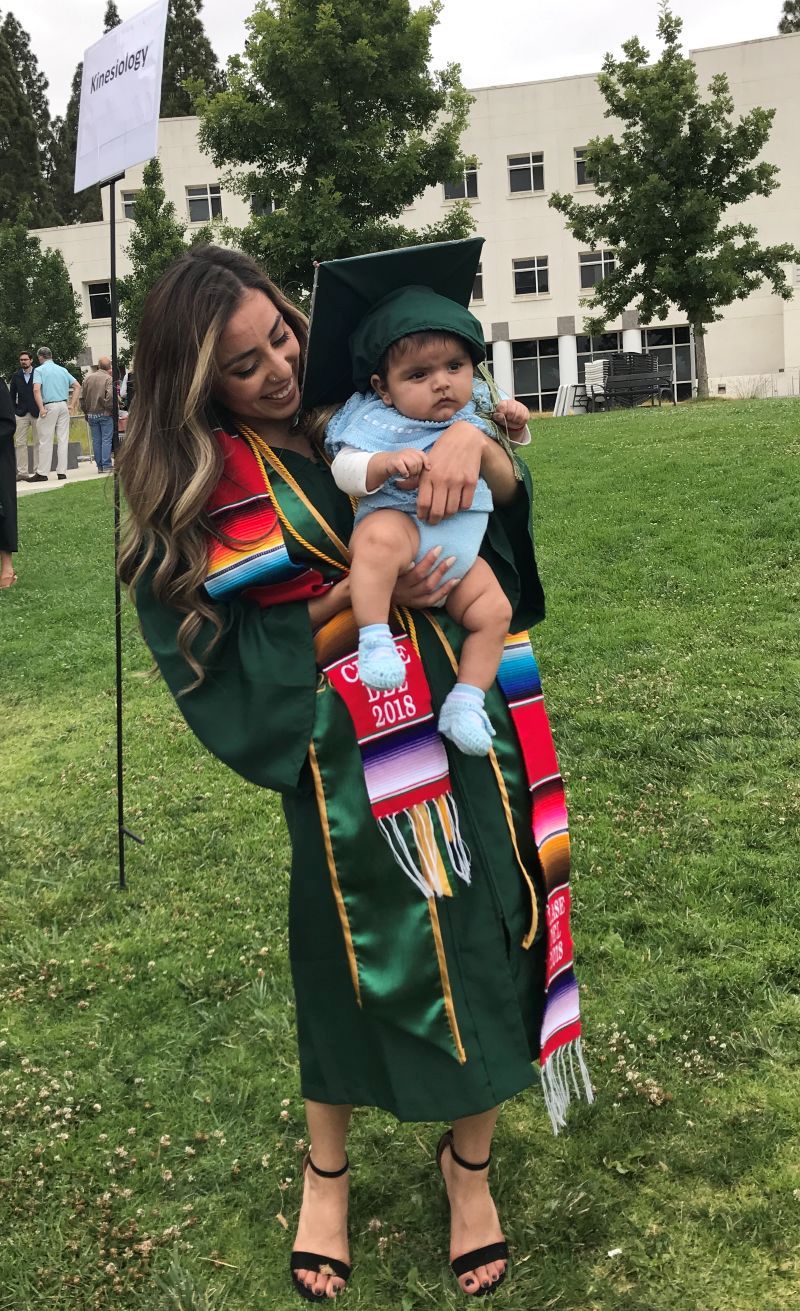
Baby Meeks and I at our undergrad graduation
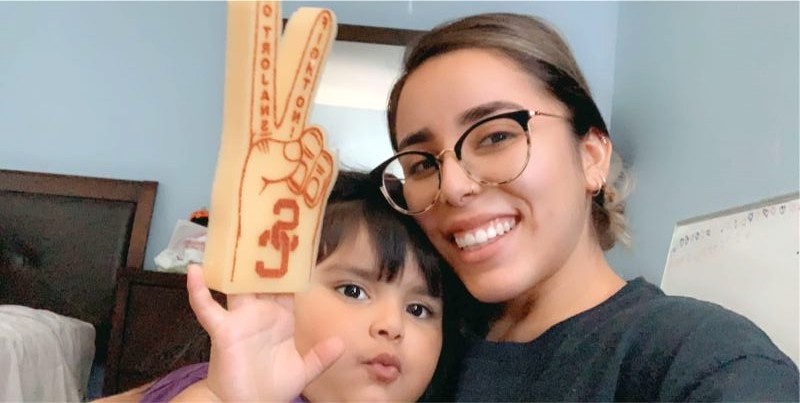
3 year-old Meeks and I celebrating the end of the summer semester
Going to college is such a romanticized notion though . . . from choosing your dream school, to moving away from home, living in a dorm, meeting the people who will become your lifelong best friends, and everything else that you daydream about until reality hits. How do you get to live all these experiences when you don’t even know the name of any universities (besides the ones stamped onto the sweaters your classmates wore), when you don’t know how/where to apply, when you’re poor and probably can’t even afford to live these experiences? I remember asking my dad if he had a savings account because, if I decided to go, college would be really expensive. He didn’t give me a clear answer but assured me that if I wanted to go to school, we would make it happen. In his words, “Hay mucho sacrificio que se tiene que hacer, pero independientemente de eso, [mientras que tenga el apoyo de todos, yo puedo] salir adelante.” Needless to say, pursuing higher education has been a very tiring journey.
It’s almost like being completely lost in the application process and scared that somehow you incorrectly inputted something in your FAFSA is a rite of passage for first-generation students. And I know for a fact that this isn’t true for all college students because I can name some of my high school peers whose parents did everything for them — but that’s besides the fact and my point is simply that we’re not all on an equal playing field. Being first-gen means figuring it out on your own and paving the way for those who will follow after you. Though this is rewarding, it is exhausting.
No one really talks about the culture shock that you may experience, the impostor syndrome, the burnout, the guilt, and all the other not-so-good things that come with college and that are compounded by being first-gen. Fully unpacking what it means to be first-generation, however, cannot be done in one blog, so stay tuned for the sequel. But I don’t want to end this blog without acknowledging that in the process of chasing and living out this dream of being the firsts in our families to go to college, we often lose sight of who we are and what we want. We carry the hopes, dreams, and sacrifices of our parents and families, which fuel our academic drive but also hold us back from other things we want to do with our life. So, I encourage you to check-in with yourself; what do you want?
⋯





